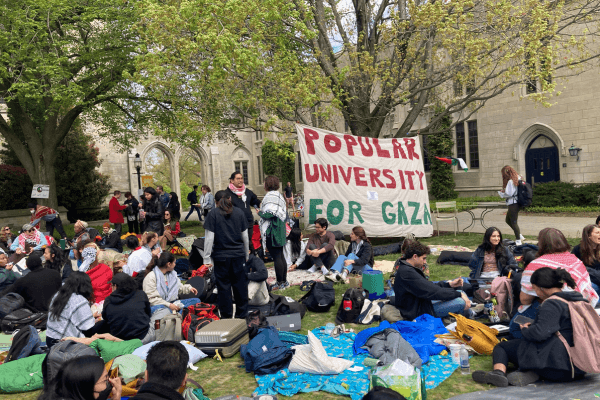“To protect the environment, days ago I announced that the United States will join the One Trillion Trees Initiative, an ambitious effort to bring together government and private sector to plant new trees in America and all around the world.” President Trump announced his plans to “protect the environment” earlier this year while delivering his third State of the Union address.
The One Trillion Trees Initiative, launched by the World Economic Forum and led by the U.N. Environment Programme and the Food and Agriculture Organization, is, as its name implies, an afforestation/reforestation effort. It was designed to support the U.N. Decade on Ecosystem Restoration 2021-2030 announced in March 2019, offered as a “proven measure to fight the climate crisis and enhance food security, water supply and biodiversity.”
Trump’s brief nod to the efforts checked a box for some, but what is the real impact of the initiative — and how much farther do we have to go to implement a vision for addressing the climate crisis?
“The first thing I thought about when I heard about the Trillion Trees initiative is that the president withdrew from the Paris Agreement,” said Tori Goebel, Communications Director at the Evangelical Environmental Network and the Young Evangelicals for Climate Action. The Trump administration officially withdrew from the Paris Agreement in November, shirking U.S. responsibility in the global response to climate change.
The administration’s record on environmental protections is abysmal — and amid a global pandemic, the Environmental Protection Agency has suspended indefinitely enforcement of environmental rules, essentially allowing companies to regulate themselves.
“[The One Trillion Trees Initiative] is well-intentioned and easy to get behind, and probably a really good long-term effort,” said John R. Platt, editor at the environmental online news site, The Revelator. “But it’s not a direct solution to the climate crisis or the extinction crisis — at least, not in the short term,” Platt added.
It is noteworthy that a disclaimer offered by the initiative itself emphasis that nature-based solutions are “not a silver bullet” and that such efforts must be undertaken “in conjunction with decarbonization of key industry sectors such as energy, transportation, heavy industry and the financial sector, as well as — critically — alongside effective strategies to end deforestation.”
Dr. Mark Ashton, professor of silviculture and forest ecology at the Yale School of Forestry & Environmental Studies, says the initiative misses the most effective component: incentives and laws to keep forests as forests.
“A lot of the problem is land conversion and the slow erosion of the forest base to development,” Ashton said, adding that none of what the initiative entails “is a substitute for actually controlling emissions of greenhouse gas by restricting fossil fuel use and converting to other forms of energy such as solar and wind.”
As for the goal of growing more wood and storing more carbon in existing forests, Ashton said that it is “well-intentioned but both naive and simplistic in regards to a solution to mitigate climate change.”
Platt also stressed that what we need now is a system-wide reduction in emissions.
“It would take 50 to 100 years for any trees planted today to truly start to make a difference,” he said. “If we don’t cut pollution and carbon emissions dramatically now, those trees won’t have 100 years to do their thing. Neither will we.”
The Trump administration recently opened up the Bear's Ears National Monument to exploitation from the energy industry. The Bear’s Ears is a sacred, tribal land in Utah that is now open for bidding from the fossil fuel industry.
“So, [Trump] is taking land that is sacred to people and using it to produce fossil fuels, which will negate the impact of planting more trees,” Goebel said. “ … the Trillion Trees project seems like a copout in light of all these actions.”
Indeed, Trump’s recently proposed budget prioritizes oil and gas development and slashes budgets for protecting natural systems. The administration also has a disastrous record on easing restrictions imposed by the Environmental Protection Agency. According to latest count, the administration has rolled back more than 90 environmental rules and regulations.
Platt called the administration’s embrace of the One Trillion Trees initiative “greenwashing,” especially considering their efforts “to destroy existing natural habitats in favor of new oil and gas developments.”
Goebel agrees.
“In Genesis we are told to tend the garden, and in the gospels we are told to love our neighbor,” she said, adding that it’s clear that “our neighbors are suffering from the weight of the climate crisis … so, as Christians, we should address the crisis as part of our faith, and President Trump is denying the reality of the climate crisis.”
Got something to say about what you're reading? We value your feedback!







